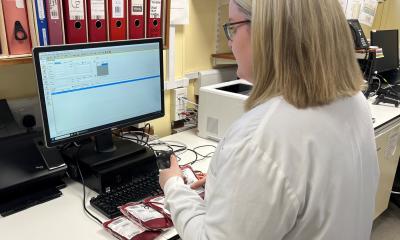Consumerism - the impact on healthcare business models and processes
At the Managers symposium Dr Pitz will discuss

Having studied computer science, with a focus in medicine, at the Technical University
in Darmstadt,
Germany, 1993
Dr Pitz received his PhD at the Technical University
of Berlin. Before joining SAP AG, he was responsible for various
IT related healthcare projects at the University Hospital,
Frankfurt.
Business models and business processes have radically changed in industries such as manufacturing and trading during the last few decades. This change has reduced costs through streamlining processes both within enterprises as well as significantly across enterprises by extending the value chain towards customers and suppliers. Cost reduction has freed up resources to drive innovation.
Market forces have had a significant role to drive this radical change. As a key player, consumer behaviour - shopping for the best price on almost every product or service - has made a major contribution to this. As all those changes wouldn’t have been possible without strong IT support, IT has become strategic in enterprises, enabling efficiency through standardisation, and providing flexibility and adaptability to accelerate innovation in increasingly competitive environments.
Why hasn’t all that happened in healthcare? In nature, healthcare in terms of diagnoses and treatment is something people need and nothing people want. Health insurances are covering the majority of the cost so no patient really looks at costs or better prices. Due to a lack of incentives, individual stakeholders, such as provider organisations, insurances or pharmaceutical industries, have not driven cross-organisational change. Thus, so far, consumerism as a key market force in many industries has been limited in healthcare.
However, we expect this to change significantly over the next years, and strong signals already exist in the healthcare market. Today, provider organisations, for example, publicly speak of competition and gaining market share; this would have been perceived as unethical years ago. Cost pressure, caused through ageing population and increasingly expensive treatments drives process efficiency in all kinds of organisations. However, similar to industries such as manufacturing and trading, the patient being transformed into an informed consumer will again play a significant role.
Well-being through prevention, attractive environments, and information is something people want and increasingly expect, as well as higher cost awareness, as co-payments and payback schemes increase. This will lead to patient centric processes, which will reach beyond hospitals to the collaborating stakeholders. Collaboration will require information sharing, enabled by privacy laws protecting the data and patients’ rights. In fact, the patient might become the owner of his/her data and decide about its distribution and use.
Healthcare organisation will increasingly adopt measures, such as process standardisation, outsourcing etc. to increase efficiency, centre around patients and collaborate with others. IT will need to become strategic to accomplish this in a competitive way. Currently the IT industry is investing in service oriented architectures to enable that change.”
08.03.2007





